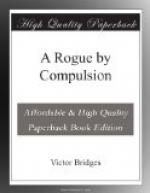He gave a few final instructions to Ellis, who was also staying behind, and then the four of us left the bungalow and walked quietly down the small garden path that led to the road. Just outside the gate stood a powerful five-seated car.
“Start her up, Guthrie,” said Latimer; and then turning to us, he added, with a smile: “I want you in front with me, Lyndon. I know Morrison’s dying for a yarn with you, but he must wait.”
Tommy nodded contentedly. “I can wait,” he observed; “it’s a habit I’ve cultivated where Neil’s concerned.”
We all clambered into the car, and, slipping in his clutch Latimer set off at a rapid pace in the direction of Queenborough. It was not until we had rounded the first corner that he opened the conversation.
“How did you know about Marks?” he asked, in that easy drawling voice of his.
“I didn’t know for certain,” I said quietly. “It was more or less of a lucky shot.”
Then, as he seemed to be waiting for a further explanation, I repeated to him as briefly as possible what Sonia had told me about McMurtrie’s reason for visiting London.
“I didn’t go into all this in my letter to you,” I finished, “because in the first place there was only just time for Joyce to catch the train, and in the second I didn’t want to disappoint her in case it should turn out to be all bunkum. You must have been rather amazed when I suddenly sprung it on McMurtrie.”
He shook his head, smiling. “Oh no,” he said—“hardly amazed.” He paused. “You see, I knew about it already,” he added placidly.
If there was any amazement to spare at that moment it was certainly mine.
“You knew about it!” I repeated. “You knew that McMurtrie had killed Marks?”
He nodded coolly. “You remember telling me in the boat that your friend Miss—Miss Aylmer, isn’t it?—had recognized him as the man she saw at the flat on the day of the murder?”
“Yes,” I said.
“Well, if that was so, and you had been wrongly convicted, which I was inclined to believe, the doctor’s presence on the scene seemed to require a little looking into. I knew that at that time he had only just arrived in London, so the odds were that he and Marks were old acquaintances. I hunted up the evidence in your trial—I had rather forgotten it—and I found just what I expected. Beyond the fact that Marks was a foreigner and had been living in London for about eight years, no one seemed to know anything about him at all. The police were so confident in their case against you that apparently they hadn’t even bothered to make the usual inquiries. If they had taken the trouble to communicate with St. Petersburg, they could have found out all about Mr. Marks without much difficulty. The authorities there have a wonderfully complete system of remembering their old friends.”
“But three years afterwards—” I began.
“It makes very little difference, especially as just at present we are on excellent terms with the Russian Secret Service. They took the matter up for me, and last night I got the full particulars I wanted about the man who had given away McMurtrie and his friends in St. Petersburg. There can be no question that he and Marks were the same person.”




